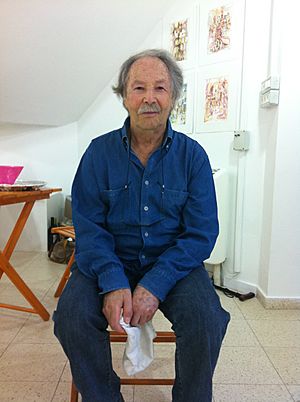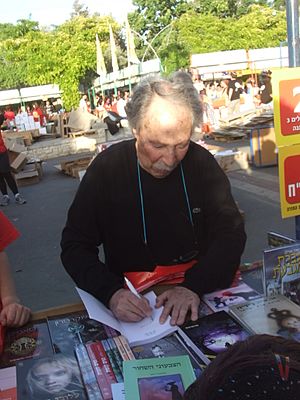Uri Orlev facts for kids
Uri Orlev (Hebrew: אורי אורלב) was a famous Israeli children's author and translator. He was born in Poland in 1931 and passed away in 2022.
Orlev received the Hans Christian Andersen Award in 1996. This award is one of the highest honors for writers of children's books. He also won the Prime Minister’s Prize for Hebrew Literary Works in 1972 and the Bialik Prize for literature in 2006.
Contents
Uri Orlev's Life Story
Uri Orlev was born in 1931 in Warsaw, Poland. His father was a doctor. During World War II, his father was captured by the Russians. Uri lived with his mother in the Warsaw Ghetto, a special area where Jewish people were forced to live. Sadly, his mother was killed by the Nazis.
A relative helped Uri and his brother hide in the ghetto. But in 1943, German soldiers found them. They were sent to the Bergen-Belsen concentration camp. While he was a prisoner there, Uri wrote poems. These poems were later published in 2005 by Yad Vashem, a Holocaust memorial.
Uri and his brother survived the Holocaust. The British Army freed them in 1945. After the war, they moved to Israel and lived on a kibbutz called Ginegar. A kibbutz is a community where people live and work together. Their father joined them in 1954.
After finishing high school, Orlev served in the Israel Defense Forces as a soldier. He later returned to the kibbutz and worked with cows. He also continued to serve in the army reserves and fought in several wars, including the Suez Crisis, Six-Day War, and Yom Kippur War.
How Uri Orlev Started Writing
While living on the kibbutz, Uri Orlev began writing short stories. On weekends, he often traveled to Haifa to watch movies with a friend. During their bus rides, Orlev would tell his stories to his friend, who encouraged him to write them down.
Orlev wrote a first version of a book. The kibbutz allowed him to spend a year near Haifa to finish his writing. This book became The Lead Soldiers, which was published in 1956. After that, he went back to working on the kibbutz.
In 1968, Orlev and his family moved to Jerusalem. He then started writing children's literature as his main job. He published over 30 books. Many of his stories are about his own childhood during the Holocaust or his early years in Israel. He wrote them in a way that children could understand.
His books have been translated from Hebrew into 36 different languages. Some of his most famous books include Run, Boy, Run, The Island on Bird Street, and The Lead Soldiers.
Uri Orlev also translated books from Polish into Hebrew. One example is Quo Vadis by Henryk Sienkiewicz. He also appeared in a documentary film called "Life is Strange," where he talked about his books and his life before World War II.
Uri Orlev was married twice and had two sons, a daughter, and four grandchildren. One of his sons, Itamar Orlev, is also a writer. Uri Orlev passed away on July 26, 2022.
Awards for Uri Orlev's Books
Uri Orlev received many important awards for his writing.
The Hans Christian Andersen Award
The Hans Christian Andersen Award is given every two years by the International Board on Books for Young People. It is the highest honor a writer or artist of children's books can receive. Uri Orlev won this award for writing in 1996.
The judges said that Uri Orlev's experiences as a Jewish boy during World War II in Poland were important to his writing. They noted that his stories, whether set in the Warsaw ghetto or Israel, always showed a child's point of view. They praised his writing for being high quality, honest, and funny, without being overly emotional. They also said he was skilled at saying a lot with few words. The judges felt that Uri Orlev showed how children can survive hard times without becoming bitter.
Other Important Awards
In 1972, he received the Prime Minister's Prize for Hebrew Literary Works. In 2006, he was given the Bialik Prize for literature.
In the United States, four of Orlev's books won the Mildred L. Batchelder Award. This award is given to the best children's book that was first published in another language and then translated into English. The four books that won were The Island on Bird Street, The Man from the Other Side, The Lady with the Hat, and Run, Boy, Run. These books were translated by Hillel Halkin.
In 1992, he also won the National Jewish Book Award for his book The Man From the Other Side.
Uri Orlev's Published Books
Here is a list of some of the books Uri Orlev wrote:
| Book name | Hebrew name | Year | Publisher |
|---|---|---|---|
| Books for Grown-Ups | |||
| Till Tomorrow | עד מחר | 1958 | Am Oved |
| The Last Summer Vacation | חופשת הקיץ האחרונה | 1968 | Daga |
| Books for Children and Young Adults | |||
| The Lead Soldiers | חיילי עופרת | 1956 | Sifriyat Po'alim |
| The Thing in the Dark | חיית החושך | 1976 | Am Oved |
| It's Hard to Be a Lion | קשה להיות אריה | 1979 | Am Oved |
| The Island on Bird Street | האי ברחוב הציפורים | 1981 | Keter |
| The Wings Turn | תור הכנפיים | 1981 | Massada |
| Big Brother | אח בוגר | 1983 | Keter |
| The Dragon's Crown | כתר הדרקון | 1986 | Keter |
| The Man from the Other Side | האיש מן הצד האחר | 1988 | Keter |
| The Lady with the Hat | הגברת עם המגבעת | 1990 | Keter |
| Lydia, Queen of Palestine | לידיה מלכת ארץ ישראל | 1991 | Keter |
| A Mouthful of Meatball | קציצה מהצהריים | 1995 | Keter |
| Last of Kin | רחוקי משפחה | 1996 | Keter |
| The Sandgame | משחק החול | 1996 | Keter |
| The Wandering Family | המשפחה הנודדת | 1997 | Keter |
| The Song of the Whales | שירת הלוויתנים | 1997 | Keter |
| Run, Boy, Run | רוץ, ילד, רוץ | 2001 | Keter |
| Poems from Bergen-Belsen (1944) | שירים מברגן-בלזן | 2005 | Yad VaShem |
| Picture Books | |||
| The Big-Little Girl illustrated by Jacky Gleich |
קטנה-גדולה | 1977 | Keter |
| Noon Thoughts | מחשבות צהריים | 1978 | Sifriyat Po'alim |
| A Hole in the Head | משגעת פילים | 1979 | Keter |
| Siamina illustrated by David Gerstein |
סיאמינה | 1979 | Am Oved |
| The Lion Shirt / A Lion for Michael illustrated by Jacky Gleich |
חולצת האריה | 1979 | Massada |
| The Black Cloud | הענן השחור | 1979 | Massada |
| How Mr. Cork Made the Brain Work | מעשה במנוח שהפעיל את המוח | 1979 | Massada |
| The Good-Luck Pacifier illustrated by Jacky Gleich |
מוצץ המזל | 1980 | Am Oved |
| Granny Knits illustrated by Ora Eytan |
סבתא סורגת | 1980 | Massada |
| Mr. Mayor | ראש העיר תן לשיר | 1980 | Massada |
| How to Be Four | מסע לגיל ארבע | 1985 | Am Oved |
| On the Wrong Side of the Bed | על צד שמאל | 1985 | Keter |
| Hairy Tuesday illustrated by Jacky Gleich |
חפיפת ראש | 1988 | Keter |
 | Chris Smalls |
 | Fred Hampton |
 | Ralph Abernathy |



